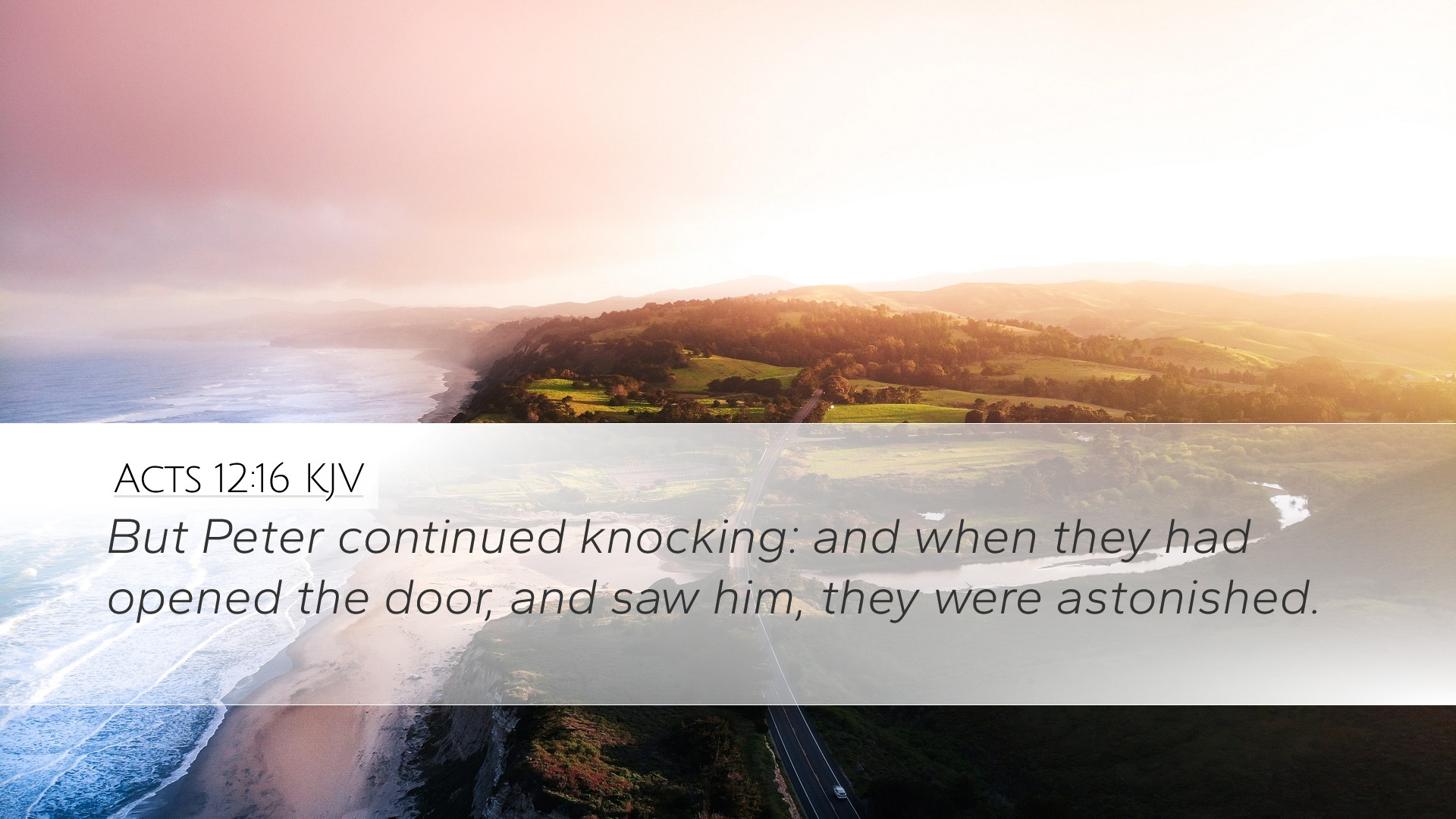Old Testament
Genesis Exodus Leviticus Numbers Deuteronomy Joshua Judges Ruth 1 Samuel 2 Samuel 1 Kings 2 Kings 1 Chronicles 2 Chronicles Ezra Nehemiah Esther Job Psalms Proverbs Ecclesiastes Song of Solomon Isaiah Jeremiah Lamentations Ezekiel Daniel Hosea Joel Amos Obadiah Jonah Micah Nahum Habakkuk Zephaniah Haggai Zechariah MalachiActs 12:16
Acts 12:16 KJV
But Peter continued knocking: and when they had opened the door, and saw him, they were astonished.
Acts 12:16 Bible Commentary
Commentary on Acts 12:16
Scripture Reference: Acts 12:16 - "But Peter continued knocking: and when they had opened the door, and saw him, they were astonished."
Introduction
The verse in question occurs in the midst of a miraculous episode in the life of the Apostle Peter. After being imprisoned by King Herod, Peter’s release by an angel shows the powerful hand of God at work. This commentary synthesizes insights from various public domain resources to deepen understanding of the text, addressing themes of faith, divine intervention, and community belief.
The Context of Acts 12
In Acts chapter 12, we witness the persecution of the church under Herod Agrippa. The narrative begins with the arrest of James, the brother of John, followed by Peter's imprisonment. The early church is depicted as fervently praying for Peter’s safety. This context sets the stage for the miraculous events that follow, culminating in Peter's unexpected arrival at the door of Mary, the mother of John Mark.
Exegesis of Acts 12:16
In verse 16, Peter's insistence to be heard, despite the initial disbelief of those gathered, is both poignant and illustrative of deeper truths regarding faith and divine providence.
Peter's Determination
Matthew Henry points out that Peter "continued knocking", emphasizing his perseverance. This act is reflective of divine promise as well as the necessity of faith. Peter's steady knocking illustrates a posture of trust in God’s deliverance and readiness to embrace the fellowship of believers once more.
The Reaction of the Believers
Upon opening the door, the astonishment of the believers speaks to the nature of their faith at that time. Albert Barnes reflects that their incredulity shows a blend of hope and disbelief, revealing a critical aspect of Christian faith—expectation of God's help mixed with doubt about its reality. It raises questions about the limits of faith even amidst prayer. The church had been praying for Peter’s release, yet when he appears, their first response is astonishment rather than recognition of God’s intervention.
Theological Implications
This moment provokes profound theological reflection on the nature of faith, prayer, and miracles. Adam Clarke suggests that this astonishment illustrates human limitations in understanding divine timing and methods. The disciples’ disappointment in their expectations, juxtaposed with God’s miraculous answer, poses an important inquiry into the ways faith can sometimes falter in the presence of divine action.
Application for the Church Today
As pastors and scholars reflect on this text, significance can be drawn for contemporary church life. Three areas warrant emphasis:
- Perseverance in Prayer: Just as the early church devoted themselves to prayer for Peter’s release, so too should modern congregations commit to consistent prayer, believing that God is at work.
- Expectations of Divine Response: The awe that followed Peter’s miraculous release underscores the reality that God may work beyond human expectations. Churches must remain open to unanticipated answers to prayer.
- Community in Faith: The communal aspect of faith is vital. Just as the community gathered at Mary’s house played a role in both Peter’s imprisonment and release, churches should foster environments of support where collective prayer and belief can thrive.
Conclusion
Acts 12:16 encapsulates a moment of surprise and joy in the early church, a reminder of the power of prayer, faith, and divine intervention. As believers, the astonishment of the early church upon witnessing Peter’s return challenges us to strengthen our faith, expect God’s action in our lives, and persist in community intercession.
Ultimately, this moment is not merely a historical account but serves as an edifying call for pastors, students, theologians, and Bible scholars to engage deeply with scripture, recognizing both the limits of our understanding and the limitless power of God.


